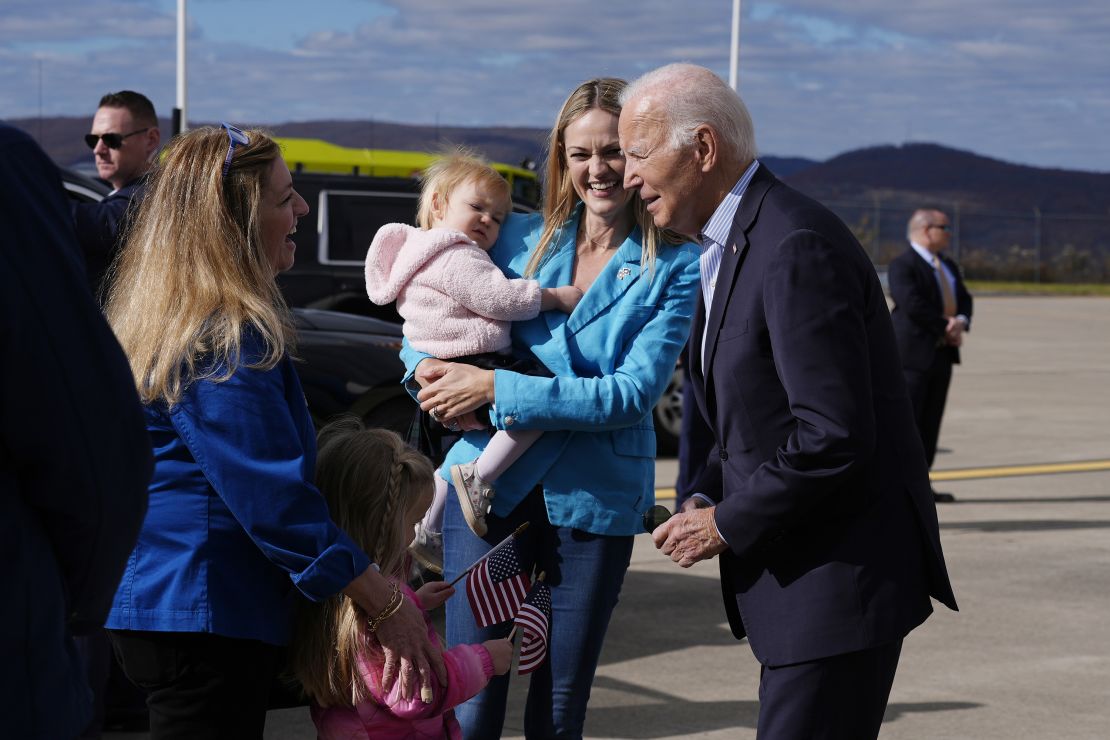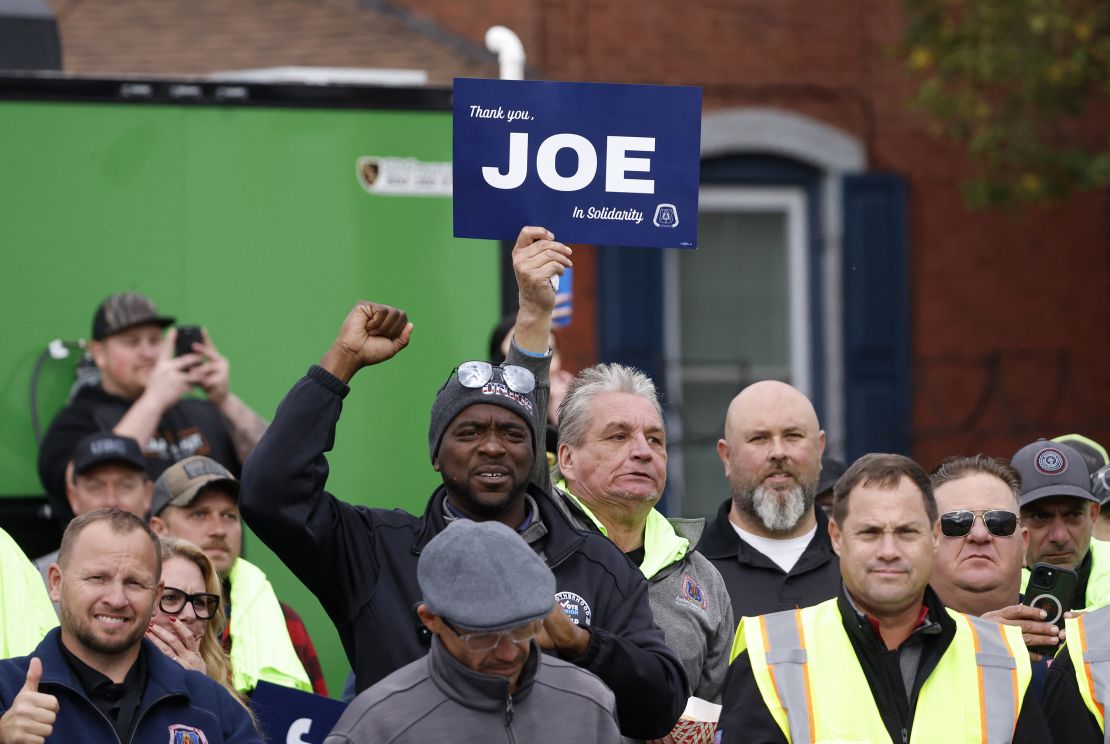In front of a few dozen union carpenters here this weekend, President Joe Biden was getting worked up.
“Now, I know some of you guys are tempted to think it’s macho guys,” Biden said, alluding to his onetime rival, former President Donald Trump, who is courting male voters in a razor-thin election against his vice president.
Not to be out-machoed, Biden recalled some long-ago rumble that went down here when he was a child.
“I tell you what, man, when I was in Scranton, we used to have a little trouble going down the plot once in a while,” he said, sounding anything but threatening. “These are the kind of guys you’d like to smack in the ass.”
Here in his hometown, the president was making what is likely to be his final trip to a battleground before Election Day. After 50 years in public life, it was a subdued final campaign appearance as a sitting office holder.
In Biden’s political winter, perhaps it was inevitable it would all come back to Scranton.
The day had the markings of a Biden classic: There was the mayor’s toddler on the tarmac, introduced as Biden’s “ice cream buddy”; there was the round of “Happy Birthday,” sung to a stranger (“She’s turning 41!”); there was the vague reference to schoolyard violence.
Vice President Kamala Harris was nowhere nearby; her campaign rally in Atlanta began around the same time Biden spoke. Nor was Sen. Bob Casey, locked in a tight battle for his Senate seat here.
None of it was quite the final-weekend campaign rally Biden once hoped to be hosting in support of his own candidacy. It wasn’t even the barnstorming tour of Pennsylvania he once envisioned conducting in support of Harris.
But even if it was a far smaller affair, Biden evinced no disappointment in his address to 100 or so members of the local carpenters union. Tacked on the wall behind his podium, next to the signs for the Harris-Walz campaign, were a few posters saying simply: “Thank you, Joe.”

“You know, we’ve asked a lot of each other, you and I, unions and me,” Biden said, recalling his long reliance on organized labor in his half-century of public life. “I ask you one more thing. I’m asking your support for Kamala and Tim Walz.”
“I’m not just asking for me,” he went on. “I’m going to be gone.”
Kept mostly away from the campaign trail this year, Biden has slowly come to terms with what has been a diminishing presence in the country’s political discourse.
An episode this week involving a verbal flub about Trump supporters being “garbage” only seemed to confirm the anxieties of many Democrats about giving Biden a larger role. In the closing stretch of a razor-thin campaign, the last thing anyone on Harris’ team wanted to be doing was responding to an apparently accidental insult made by someone who is no longer a candidate.
There was a time when Biden imagined a far greater role for himself this fall. He declared in September he would be “on the road” from Labor Day onward, advocating for his vice president.
But as the 2024 campaign draws to a photo finish, the political imperatives of distance from an unpopular incumbent outweighed any desire on Harris’ part to pay homage to the man who handpicked her as his successor.
To be sure, Harris has demonstrated only loyalty to Biden, in public but also in private. She genuinely respects and cares for the president and understands his desire to help her win.
But in a “do no harm” election, where every utterance could be a dealbreaker for a handful of voters in a battleground state, there has been little room for celebrating Biden’s legacy, at least on the campaign trail.
And so, as Harris headlines arena rallies with Beyoncé and Jennifer Lopez — and as Democratic surrogates like Barack and Michelle Obama and even the first lady, Dr. Jill Biden, make swings across the battlegrounds — Biden is showing up at union halls, playing to his strengths and trying to avoid stepping in it again.
In Scranton, where the President Biden Expressway leads into downtown, the goodwill is evident.
“Scranton becomes part of your heart. It crawls into your heart. It’s real,” Biden said. “I’m so proud to be back.”
It was in Scranton that Biden spent the morning of Election Day in 2020, addressing supporters gathered outside a union hall and stopping by his childhood home.
Signing the living room wall, Biden wrote: “From this house to the White House with the grace of God.”
And it was to the White House he went, propelled by support in places like Scranton, where Biden made a pitch centered on economic opportunities and performed better among White working-class voters than his Democratic predecessors.

Biden still believes he can be of assistance in a state like Pennsylvania, where he maintains deep roots and which he’s visited more than practically anywhere else since taking office. Just since July 21, the day he announced he would drop his bid for a second term, Biden has been to Pennsylvania 10 times.
He has voiced frustration that polls show a tight race — tighter than he believes it should be, against a candidate like Trump — and wants to help where he can.
As he’s watched from the sidelines of the race that he was in a little more than three months ago, Biden has embarked on some soul-searching, those close to him say, reflecting on both the long arc of his career and its abrupt end.
Biden, these people say, remains firm in his view that he would be able to defeat his predecessor in November if he remained at the top of the Democratic ticket. But he recognizes that offering up that view to others might not be in anyone’s best interests.
“Folks love Joe Biden. And they respect and recognize that Joe Biden chose Kamala Harris to be his running mate, served alongside her as Vice President, endorsed her when he chose to step back from being our nominee,” said Sen. Chris Coons, Biden’s friend and fellow Delawarean, said this week on CNN. “I do think it’s important that folks hear from President Biden, but they know where he stands and they know that he fully embraces and supports Vice President Harris.”
As he wrapped up his speech to the carpenters here, Biden sought to lay out the stakes of Tuesday’s election.
“What will happen — what will happen if you trade in my administration for his?” he said. “No, I’m not joking. I’m nothing special.”
That moment of self-effacement prompted a cry of, “Yes you are!” from his audience, following by a chant of “Thank you, Joe!”




